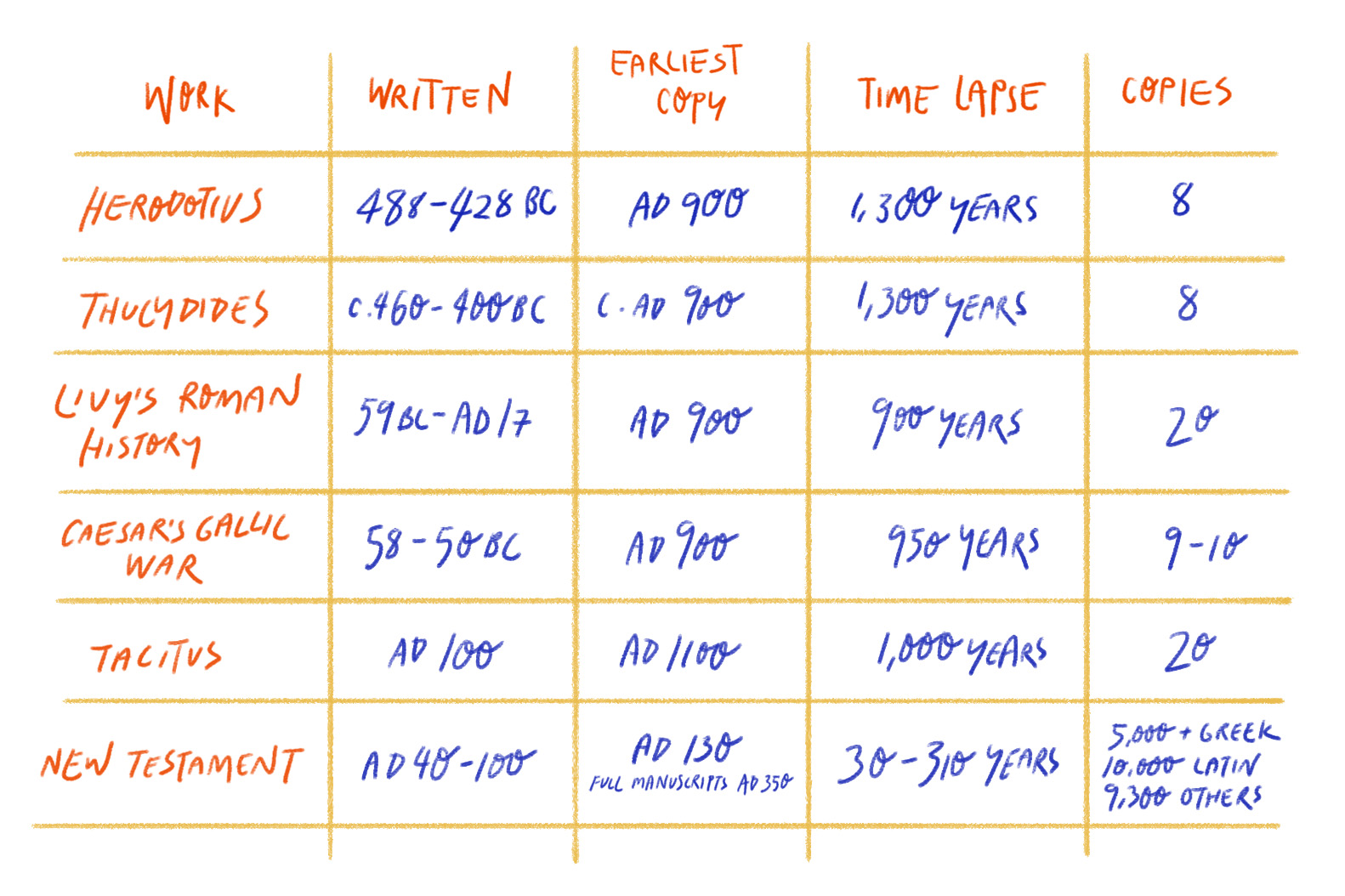Jesus is arguably the most significant human figure in history. There’s overwhelming historical evidence that Jesus existed.
1. He was a real person who existed
No serious historian would suggest that Jesus didn’t exist. We know from evidence outside of the New Testament that Jesus existed, from historians like Tacitus and Suetonius.
The first-century Jewish historian Josephus wrote this about Jesus: “There was about this time Jesus, a doer of wonderful works.”
And he then goes on to talk about the crucifixion of Jesus and his alleged resurrection.
2. The Bible tells us about him
Now, of course, the New Testament was written a long time ago and people say: How do we know that what we have here hasn’t been changed over the years? The answer is: Through a science called ‘textual criticism’.
Essentially, the way textual criticism works is like this: the more manuscripts that you have, and the earlier they are, the more you can be sure about what the original said. Take a look at the graphic below.

3. He was more than a great human being
Many today would say: “Yes, he was a human being. We know he existed. Maybe he was a great human being. Maybe he was a great religious teacher – but no more than that. To suggest he was the Son of God, to suggest he’s God, that’s going too far.”
Jesus’ teaching was centred on himself. Great religious teachers point away from themselves. They say: “Don’t look at me. Look at God.”
Jesus, who personified humility, said: “Look at me. Come to me.”
4. He came to satisfy
This question of ultimate meaning and purpose: What is our life about?
This sense of what you might call a spiritual hunger; this sense that other things don’t quite satisfy. However good these things are, there’s always this slight void, this sense that something is missing.
Jesus said: “I am the bread of life.” (John 6:35) If you want that hunger satisfied, come to Jesus.
5. He gives us freedom
There’s stuff in our lives that we don’t like. There are things and habits that can be addictive.
Jesus said: “If the Son sets you free, you will be free indeed.” (John 8:36)
Then there’s all the stuff we carry around: worry, anxiety, fear, guilt.
Jesus said: “Come to me, all you who are weary and burdened, and I will give you rest.” (Matthew 11:28) If you want peace, come to Jesus.
6. He forgives
Jesus made certain indirect claims: He claimed to be able to forgive sins. He went up to people and said: “Your sins are forgiven.” When Jesus did that, the lawyers said: “Who can forgive sins but God alone?”
Forgiveness is at the heart of what Jesus came to do: to make forgiveness possible. It’s at the heart of Christianity.
7. He claimed to be God
Jesus claimed to be more than a great religious teacher – He claimed to be “the way, the truth, the life”. He considered himself to be the Son of God.
Jesus also made direct claims like “I and the Father are one.” (John 10:30-33)
He said: “If you receive me, you receive God.” “If you welcome me, you welcome God.” (Matthew 10:40) He said: “If you have seen me, you have seen God.” (John 14:9)
“I believe in Christianity as I believe that the sun has risen: not only because I can see it, but by it I see everything else.” (C. S. Lewis)
Have you ever noticed the difference between seeing without glasses, and seeing with them? Perhaps you could see before, but you can really see with these glasses. And that is the difference Jesus makes.
Jesus is like a lens through which we see God. He’s the way to Father God. He’s the lens by which we see the world in a totally different dimension and clarity.
Jesus said he is the truth. It’s astonishing how much evidence there is for the life, death and resurrection of Jesus.
When Jesus said “I am the truth”, the Hebrew understanding of “truth” was not just intellectual truth or head knowledge – but heart knowledge.
In other words, truth as experienced. It means beyond examining the evidence for the resurrection, to actually experience a relationship with the risen Jesus Christ.
He said: “I have come that they may have life, and have it to the full.” And Jesus came to deal with the stuff that stops us from having that.
This is the amazing news: God loves you. We are loved by God.
And he came in the person of his son, Jesus, to die on a cross for you and for me. And he took all of our guilt and sin in our place, so we could be free to enjoy life to the full.
8. His teachings are acknowledged as the greatest of all time
What evidence is there to support His claims? His teaching. Many of our laws were originally founded on them.
- Love your neighbour as yourself. (Mark 12:31)
- Do to other people as you would have them do to you. (Luke 6:31)
- Love your enemy. (Matthew 5:44)
In 2,000 years no one has ever improved on the moral teaching of Jesus.
Think how much we’ve advanced in the last 10 years in science and technology. Yet in 2,000 years no one has ever improved on the moral teaching of Jesus. They’re the greatest words ever spoken. They’re the kind of words you’d expect God to speak.
9. The things He did supported His claims
Jesus performed miracles. He loved the marginalised. He fed the hungry. He healed the sick. Ultimately, he laid down his life for us. Jesus said: “Greater love has no one than this, than to lay down his life for his friends.” (John 15:13)
Often the real test of character is when we’re under pressure. And when Jesus was being tortured he said about his torturers: “Father, forgive them. They don’t know what they’re doing.”
And think of his fulfilment of prophecy. No one else in the history of the world has had a whole collection of books written about them before they were born. Jesus fulfilled over 300 prophecies, 29 of them in a single day.
“Well,” you might say, “maybe he got hold of the Old Testament, read all these prophecies and thought, ‘Right, I’d better go around fulfilling all of these!'”
The problem about that idea is the sheer number of prophecies. And humanly speaking, he had no control. The exact manner of his death was prophesied. The place of his burial. His resurrection. Even the place of his birth was prophesied.
10. He was raised to life
When Jesus died and was buried, he was raised to life. Jesus’ conquest of death is the cornerstone of Christianity.
There’s hope beyond this life.
Looking at what Jesus claimed about himself, it’s clear that he did claim to be a man whose identity was God.
When you look at the evidence of his teaching, the things that he did, his character, his fulfilment of prophecy and his resurrection, it would be absurd, illogical or unbelievable to say Jesus was insane or a fraud.
On the other hand, it provides the strongest possible supporting evidence that what Jesus said about himself was true.
This article was adapted from the Alpha Transcripts and has been republished with permission. If you have more questions and would like to further explore the basics of the Christian faith, find out more about Alpha or use the map below to connect with an Alpha group near you.
- Who do you think Jesus is?
- What do you feel when you think about Jesus?
- What is holding you back from believing in Jesus?










